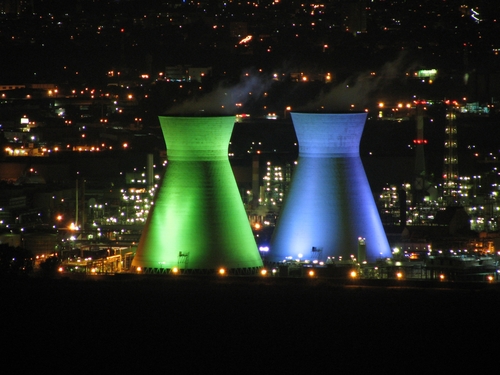Israel’s Natural Gas Future: A Promising Land?

Please note that we are not authorised to provide any investment advice. The content on this page is for information purposes only.
The first gas has started flowing from Israel’s supergiant Tamar gasfield in the Levant Basin. Where it will go will redraw the Mediterranean energy map and the geopolitics that goes along with it.
The Tamar field stakeholders announced on 30 March that the gas had started flowing, raising the value of Texas-based Noble Energy Inc. (NYSE: NBL), which holds a 36 percent stake, and Israel’s two Delek Group subsidiaries, which each hold a 15.6 percent stake.
The first gas has started flowing from Israel’s supergiant Tamar gasfield in the Levant Basin. Where it will go will redraw the Mediterranean energy map and the geopolitics that goes along with it.
The Tamar field stakeholders announced on 30 March that the gas had started flowing, raising the value of Texas-based Noble Energy Inc. (NYSE: NBL), which holds a 36 percent stake, and Israel’s two Delek Group subsidiaries, which each hold a 15.6 percent stake.
For now, the gas is being pumped to mainland Israel, where it will feed the domestic market, but exports should begin in 2-3 years. What Israel has in mind is the European market, via a hoped-for undersea Mediterranean pipeline to Turkey, which has the infrastructure to get it to Europe.
The competition for this prized market is stiff. In total, the Mediterranean’s Levant Basin has an estimated total of 122 trillion cubic feet of gas and 1.7 billion barrels of oil. Lebanon and Cyprus are eyeing the same market for their own Levant Basin gas resources. Cyprus has found gas in its section of the basin, and Lebanon has announced a tender for exploration off its shoreline.
The Greek Cypriot government believes it is sitting on an amazing 60 trillion cubic feet of gas, but these are early days—these aren’t proven reserves and commercial viability could be years away. In the best-case scenario, production could feasibly begin in five years.
Related: Cyprus Bailout: Centre Of A Power Struggle Over Natural Gas?
Related: Greece Potentially Sitting On $600 Billion Worth Of Natural Gas: Report
Exports are even further afield, with some analysts suggesting 2020 as a start date.
Israel has the upper hand right now in terms of development and production, but it lacks the infrastructure without Turkey.
Israel was originally hoping to lay a pipeline that would traverse both Cyprus and Turkey, but there are too many political pitfalls to this plan (whichwould essentially mean a final resolution to the Turkey-Cyprus spat). The ideal would have been a pipeline that connects all the Levant Basin resources—including Lebanon, Israel, Cyprus and Turkey—but this is the stuff of geopolitical dreams.
[quote]In the end, it is shaping up that an Israel-Turkey pipeline is not only possible, but coming to fruition. Earlier this month an official apology from the Israeli prime minister to his Turkish counterpart for some high-level grievances was engineered by US President Barack Obama. It was an unprecedented move by Israel and one that illustrates how important this pipeline is for Israel. An apology was really the only thing keeping Turkey from green-lighting this pipeline project without a backlash at home.[/quote]This Israel-Turkey pipeline makes Lebanon and Cyprus nervous. It essentially cuts them out of the equation. Politics for now will keep Lebanon from connecting up to any Israeli pipeline, and Turkey won’t have a connector to Cyprus.
Related: Turkey Israel Economic Relations Continue Despite Tensions
Related: Turkey: The Big Winner In The Mediterranean Shale Game?
Russia’s Gazprom, of course, is not keen to lose its stranglehold on the European market. To that end, it’s jumped in on Tamar itself, obtaining exclusive rights from Israel to develop the field’s liquefied natural gas (LNG). Here’s the plan: Russia is hoping to divert Israeli gas exports to Europe by banking on these resources being turned into LNG for Russian export to Asian markets instead. Russia is willing to invest heavily in a $5 billion floating LNG facility to this end. In return it gets exclusive rights to purchase and export Tamar LNG. (Gazprom has signed the deal but it still awaits final approval from Israel).
[quote]For Israel, this is a windfall. There is an estimated 425 billion cubic meters (16 trillion cubic feet of gas in its Leviathan field, plus the 250 billion cubic meters in the Tamar field, which is now officially pumping. All this gas is worth about $240 billion on the European market, and Tamar gas alone could boost Israel’s GDP by 1 percent annually. [/quote]Related: Israel: The Saudi Arabia of Shale Oil ???
Related: Will The Arab Spring Cause Israel’s Natural Gas Supply To Run Dry?
For now however, the Tamar gas will result in a decline in the price of electricity for Israelis by way of reducing the production costs for the state utility.
For Europe, it will mean newfound power to deal with Russia differently like it did with the recent Cypriot bailout package that came along with a harsh lesson for Russian oligarchs who are seeing their Cypriot banks holdings sequestered.
By Jen Alic, OilPrice.com
Jen Alic is co-founder and senior analyst for ISA Intel consulting and editorial director for the Washington, DC-based Global Intelligence Report.
Gas Starts Flowing from Israel’s Levant Basin, What Now? is republished with permission from OilPrice.com
Get more special features in your inbox: Subscribe to our newsletter for alerts and daily updates.
Do you have a strong opinion on this article or on the economy? We want to hear from you! Tell us what you think by commenting below, or contribute your own op-ed piece at [email protected]




